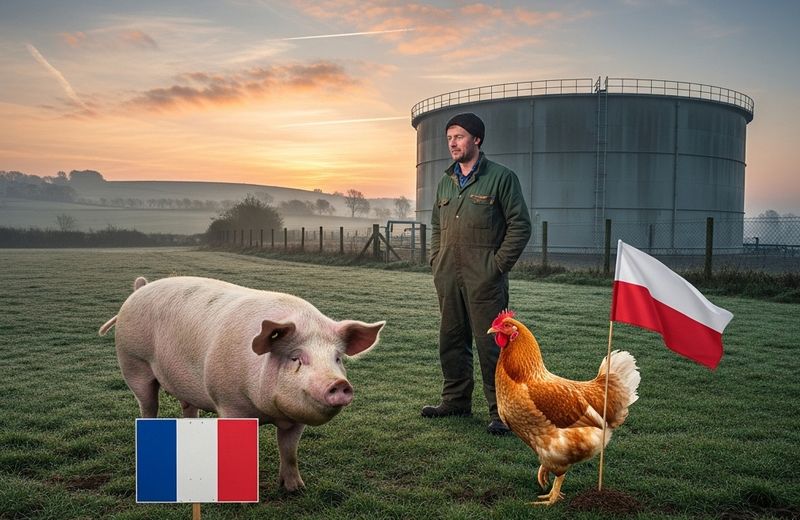
Market Pulse: UK CO2 Warning, a French Processing Merger, and Poland's Poultry Confidence
The UK meat sector faces a critical CO2 supply risk, two French co-ops merge their pork divisions, and Poland's poultry sector remains confident despite disease challenges
From critical supply chain vulnerabilities in the UK to major consolidation in France and resilient optimism in Poland, this week’s developments are shaping the operational landscape across Europe. We break down the latest news and what it means for your business.
UK Supply Chain: Meat Sector "Vulnerable" as CO2 Supply Under Threat
What happened: The British Meat Processors Association (BMPA) has issued a stark warning about the UK's supply of food-grade CO2, following the announced closure of one of the country's two major bioethanol plants. With the Vivergo plant ceasing production at the end of August, the UK is now heavily reliant on a single domestic plant (Ensus) and a handful of EU suppliers. The BMPA warns that if the second plant also closes, the UK meat industry would be left "vulnerable" to shortages and sudden price spikes.
Why it matters: This is a critical threat to the entire UK food and drink industry. CO2 is essential for modified atmosphere packaging (MAP), which extends shelf-life, and for humane stunning in abattoirs. A shortage would bring a significant portion of the UK's processing capacity to an immediate halt, as we have seen in previous crises. The situation highlights the fragility of a key national supply chain.
Implications & suggested actions:
Processors: This is an urgent risk to your business continuity. Immediately contact your CO2 supplier to get assurances on supply and discuss contingency plans. Review any on-site storage capacity and explore alternative stunning or packaging technologies where feasible.
Wholesalers & Retailers: A CO2 shortage would have an immediate and severe impact on the availability of fresh packed meat. Engage with your processor suppliers now to understand their contingency plans and the potential risk to your own supply chain.
All UK Stakeholders: This is a national food security issue. Support the BMPA's call for government action to secure a long-term, resilient domestic supply of food-grade CO2.
Corporate Strategy: French Co-ops Merge to Create Pork Powerhouse
What happened: Two of France's largest agricultural co-operatives, Cooperl Arc Atlantique and Agrial, have announced the merger of their pork processing divisions. The move will create a new, single entity that will be one of the dominant players in the French pork market, with significant scale in slaughtering, cutting, and value-added processing.
Why it matters: This is a major consolidation move in one of the EU's key pork-producing nations. By combining their operations, the co-operatives aim to create significant efficiencies, increase their negotiating power with retailers, and better compete with large-scale processors from Spain and Germany. This continues the trend of consolidation across the European meat sector, as we also noted in our August 25th report on ABP's latest UK acquisition.
Implications & suggested actions:
French Farmers & Suppliers: As members of these co-operatives, this merger should, in theory, create a stronger and more efficient route to market for your pigs. It is crucial that the new entity delivers on its promise to improve returns for its members.
Processors (Competitors):- The scale of this new merged entity will significantly increase competitive pressure in the French market. Smaller and independent processors will need to focus on their agility, niche products, and regional identity to compete.
Retailers (France): This consolidation reduces the number of major primary pork suppliers in France. While it may create a more efficient partner, it also increases your reliance on a smaller number of key accounts, making the strength of your commercial relationships more important than ever.
Market Trends: Polish Poultry Sector Remains Confident Despite HPAI
What happened: Despite being significantly impacted by Highly Pathogenic Avian Influenza (HPAI) over the past year, the Polish poultry sector remains confident about its market position. Industry leaders have stated that while the disease has led to the culling of millions of birds and created some short-term supply chain challenges, the sector's scale and efficiency mean it will continue to be Europe's largest poultry meat producer.
Why it matters: This demonstrates the incredible resilience and structural cost-advantage of the Polish poultry industry. Even after severe disease outbreaks, the sector can recover quickly and maintain its dominant share of the EU market. As we highlighted in our August 26th report, Poland's poultry exports to Western Europe continue to grow, putting sustained pressure on producers in higher-cost countries.
Implications & suggested actions:
Poultry Farmers & Processors (Western EU): The confidence of the Polish sector, even in the face of HPAI, is a clear signal that the competitive pressure is not going away. Focusing on differentiated products, such as higher-welfare or organic, is the most viable long-term strategy.
Wholesalers & Buyers: Poland remains the go-to source for large volumes of competitively priced poultry. However, the ongoing HPAI risk means it is prudent to maintain a diversified sourcing strategy and not become overly reliant on a single country.
Veterinarians & Health Officials: The Polish experience highlights the immense challenge of controlling HPAI in a region with a high density of poultry farms. It reinforces the importance of the new EU-wide vaccination strategies that are currently being finalised.
Sources
Warning closure of UK bioethanol plants would leave UK meat sector 'vulnerable' over CO2 - Pig World (21 August 2025)
French co-operatives Cooperl and Agrial to merge pork divisions - Les Marchés (27 August 2025)
Polish poultry sector confident despite HPAI impact - WATTPoultry.com (24 August 2025)
